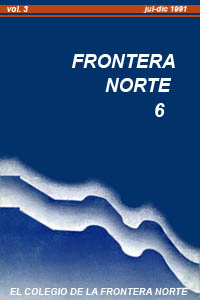Canada, the United States and Mexico: the development of trilateralism
Contenido principal del artículo
Resumen
Detalles del artículo
Las/los autoras/es que publiquen en esta revista aceptan las siguientes condiciones:
- Las/los autoras/es conservan los derechos de autor y ceden a la revista Frontera Norte (RFN) el derecho de la primera publicación, mediante el registro de los textos con la licencia de Creative Commons Atribución-No comercial-Sin derivar 4.0 internacional (CC BY-NC-ND 4.0), que permite a terceros utilizar lo publicado siempre que mencionen la autoría del trabajo y a la primera publicación en esta revista.
- Autorizan que su artículo y todos los materiales incluidos en él sean reproducidos, publicados, traducidos, comunicados y transmitidos públicamente en cualquier forma o medio; así como efectuar su distribución al público en el número de ejemplares que se requieran y su comunicación pública, en cada una de sus modalidades, incluida su puesta a disposición del público a través de medios electrónicos o de cualquier otra tecnología, para fines exclusivamente científicos, culturales, de difusión y sin fines comerciales.
- Los autores/as pueden realizar otros acuerdos contractuales independientes y adicionales para la distribución no exclusiva de la versión del artículo publicado en esta revista (por ejemplo: incluirlo en un repositorio institucional, página web personal; o bien publicarlo en un libro) siempre que sea sin fines comerciales e indiquen claramente que el trabajo se publicó por primera vez en Frontera Norte (RFN), [agregando la ficha bibliográfica correspondiente: Autor/es. (año). Título del artículo. Frontera Norte, volumen (número), pp. doi: xxxx ].
Para ello, los autores deben remitir el formato de carta-cesión de la propiedad de los derechos de la primera publicación debidamente llenado y firmado. Este documento debe cargarse en formato PDF en archivos complementarios dentro de la plataforma OJS.

Este obra está bajo una licencia de Creative Commons Atribución-No comercial-Sin derivar 4.0 internacional (CC BY-NC-ND 4.0).
Citas
Michael Hart, A North American Free Trade Agreement: The Strategic Implications for Canada (Halifax: Institute for Research on Public Policy, 1990).
R. Craig Brown, Canada's National Policy, 1883-1900: A Study in Canadian American Relations (Princeton: Princeton University Press, 1964); John Dales, The Protective Tariff in Canada's Development (Toronto: University of Toronto Press, 1966); "The National Policy, 1879-1979," Journal of Canadian Studies, 14 (Autumn. 1979).
U.S. economic foreign policy is effectively documented in, among many other studies, Alfred Eckes, Jr., The United States and the Global Struggle for Minerals (Austin: University of Texas Press, 1979); and S. J. Randall, United States Foreign Oil Policy, 1919-1948: For Profit and Security (Montreal: McGlll-Queen's University Press, 1985).
For the 1911 debate see: Paul Stgeven, ed.. The 1911 Election: A Study in Canadian Politics (Toronto, 1970); L. Ethan Ellis, Reciprocity 1911: A Study in Canadian-American Relations (New Haven: Yale University Press, 1939). On Canadian policies see C.P. Stacey, Canada and the Age of Conflict: A History of Canadian External Policies, vol. 1: 1867-1921 (Toronto: University of Toronto Press, 1977).
C.P. Stacey, Canada and the Age of Conflict, vol. 2: 1921-1948, The Mackenzie King Era (Toronto: University of Toronto Press, 1981); on the American side see Robert Dallek, Franklin D. Roosevelt and Foreign Policy.
Robert Cuff and J. L. Granatstein, Ties that Bind: Canadian-American Relations in Wartime from the Great War to the Cold War (Toronto, 1977).
U.S. Department of State, Foreign Relations of the United States. 1948, (Washington, 1974), IV, 419-24.
Ronald J. Wonnacott, "U.S. Hub and Spoke Bilaterals and the Multilateral Trading System", C.D. Howe Commentary (Toronto: C.D. Howe Institute, October 1990).
Lorraine Eden and Maureen Appel Molot, "The View from the Spokes: Canada and Mexico Face the US", in S.J. Randall, H. Konrad and S. Silverman, The Challenge of North American Integration (Calgary: University of Calgary Press, in press).
Steven Reitsma, "Canada, United States, Mexico: Trade Policy Options", Canadian Business Review (Winter, 1990), p. 18.
Reitsma, op. cit. provides a thorough overview of the Hart and Lipsey Interpretations. See as well, Lipsey, "The Case for Trilateralism", in Steven Globerman, ed., Continental Accord: North American Economic Integration (Vancouver: Fraser Institute, 1991).
Christian Allard, "Mexico For Sale: Gringos Welcome", Canadian Business (November 1990), p. 75.
A number of individuals, including the author of this paper, were invited to make written submissions. For the hearings themselves, see Minutes of Proceedings and Evidence of the Standing Committee on External Affairs and International Trade Pursuant to Standing Order 108 (2), an encamination of Canada-U.S. -Mexico trade Negotiations (Ottawa: 1990).
Maclean's, October 8, 1990.
Winfield cited in Canadian Business (November 1990), p. 73.
Eden and Molot, "From Silent Integration to Strategic Alliance: The Political Economy of North American Free Trade", Presented at the annual meetings of the International Studies Association, Vancouver, B.C., March 22-24, 1991.
Maclean's, October 8, 1990.
